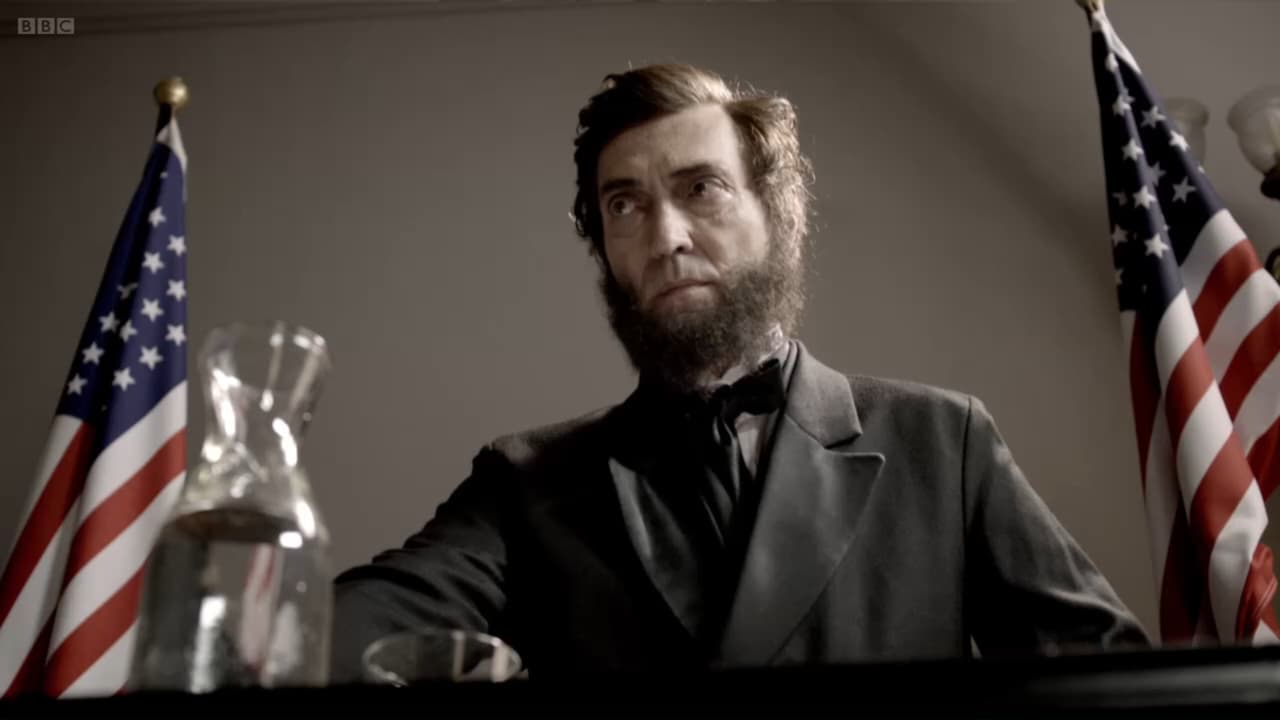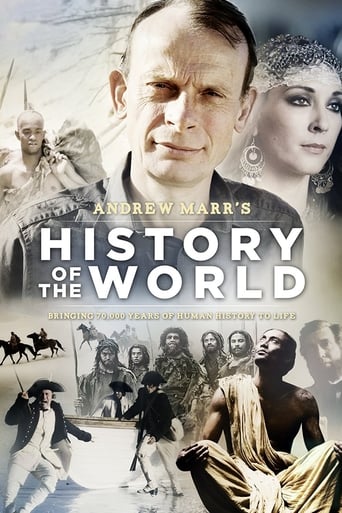

Wonderful character development!
... View MoreWell Deserved Praise
... View MoreStrictly average movie
... View MoreExcellent, a Must See
... View MoreWhen the history of the world did really begin? Or to be precise, how did our own story really began? It is actually an epic 70,000-year worth of the history of the human race and the world itself. But before one think they know everything there is to make up the composition of the history of the world itself, the eight-part epic series is divided into eight different themes.First, it is the earliest of human history in Africa and how humans came to find themselves living in various parts and survive against the odds to do so. Second, it is the rise and fall of the empires as the world know it, and the empires whose legacy are actually still with us today. Third, the ways how humans think and behave and the means they use to execute it. Fourth, when the human race began to explore beyond where they live and what they have always know. Fifth, re-examining the beginning of the age of capitalism and colonisation and how the stock market as we knew it came about. Sixth, the age of revolutions when it began to happen around the world where people found the courage to stand up against the hierarchical order of the church and monarchy from the Americas to Europe and back but also the revolutions taking place in the scientific and medical world. Seventh, how the Industrial Revolution in Britain would come to be felt around the world when it made its presence felt even in China. And last but not least, exploring with the major world events which took place in the 20th century of the two world wars, where democracy was being challenged by other ideologies especially communism where Russia and China comes under the microscope, and where science and technology continue to make our lives better in ways we would not have imagined centuries ago and also backfire at the same time.Depending on how much one know about the various eras in history, it can still be eye-opening and what we thought we knew being re-examined. The letters of the alphabet might have been something we take for granted, but it was the Phoenicians whom are no longer in existence who had created the modern alphabetical system. Christopher Columbus has always been acknowledged as the man who founded America, but there was also someone else in the exploration who had spotted the New World as well. If economic bubbles look like a recent phenomenon, it had already happened with the tulip bubble in the Netherlands in the 1600s and has come and go ever since. Not only that, it was the Dutch which gave the world the stock exchange as we knew it.But it is also a documentary series which does force one to re-examine what we have always being told. History has always has a knack of being written by the viewpoint of the winners, but for the conquered, it never got the chance to tell its side of the story. It is the fifth episode on the age of capitalism and colonisation where the uncomfortable truths of how the major European powers expanded their empires was being brought to the fore, and the origins of the Opium War which led to Hong Kong becoming a British colony, where the Chinese viewpoint is being told as well apart from the British perspective.But history has always told us, there are always people who dared to go against the system and won. There are also those who lost, but their vision would be felt in the years and centuries to come. And even the well-known world religions had been challenged before they became established themselves - Christianity, Buddhism and Islam. Not only that, it is being taken for granted and still being fought for these days comes under the spotlight - the origins of democracy as we know it. But even in ancient Greece, it had been challenged in terms of how it would be executed, something which would look familiar to the modern viewer.History might have been filled with wars, revolutions, tragedies, but it has also being filled with triumphs, innovations and inventions which backfire. The medical and scientific triumphs also has their time in the series, like Johannes Gutenberg and the printing press which will forever come to change the way how the human race receives information, Thomas Edison and the light bulb, the accidental discovery of penicillin by Alexander Fleming, and Edward Jenner with his work in smallpox vaccine and vaccination. The bombing of Hiroshima and Nagasaki might had ended Second World War in the Asia-Pacific, but one of those behind the Manhattan Project would never get over what he did. He is J. Robert Oppenheimer.Human beings always has the ability to invent and reinvent themselves, coming up with various ways to think and behave and never like it when others want to challenge the status quo, but also having the ingenuity to think of ways to make lives better for many. Ultimately, it is the human race which is us who is writing the history of the world and a story that we are still writing, and the world is in the early years of the 21st century. Sometimes history does have the ability to surprise us and challenge what we thought we know as well. The only downside is that the various stories told can look brief at times. But still, that is what make this documentary series constantly fascinating with each episode jam-packing as many as it can into the theme for the episode in question, something to make one think twice of what we know even if we think we know.
... View MoreIt's a beautifully filmed and cleverly structured series that offers many interesting angles and unearthing of lesser-known facts. It's certainly watchable. And it's honest marketing because its wish to be a feature film (or twenty feature films, in the very least) so blatantly gets the better of scholarly sobriety time and again. I, for one, can deal with that. I don't mind documentaries with actors dressed up as historical persons as long as the costumes are okay and the actors don't get any lines to speak – and in this, Andrew Marr's History succeeds in moderation.What irks me most about the series is its ill-concealed propagation of our by now all too familiar politically correct gospel that goes: "all white people are ba-ad and greedy, all others are innocent victims." And Andrew Marr's indignant tone of voice and sardonic face don't help matters.Take his episode on Pizarro's raid of the Incas. According to Marr, the Inca Atahualpa, simply because he had heard that the Bible contained the word of God, blundered into throwing the Bible to the ground, thus giving Pizarro occasion to butcher the whole indigenous Peruvian population. After supplying the Spanish with gold, 'Pizarro had no further use of Atahualpa' and had the poor dear garroted. In so many words, Pizarro is deprived of other motives, such as foreseeing that executing the Inca would bring the entire empire to its knees – and it lies entirely beyond Marr's moral lesson to relate that the Inca Empire just might have been far worse than the Spanish.One more example from the series will suffice: when relating the dropping of the atomic bombs in 1945, Marr follows the usual marring of this event by omitting to mention that both Hiroshima and Nagasaki were military targets. One was military head quarters, the other home of the Mitsubishi torpedo factories. That the Japanese chose to surround their military HQs and plants with women and children does not entirely justify the usual footage of children playing in schoolyards as the only 'before shots' of the bombings.What we don't get in Marr's series, luckily, are the attempts to excuse the communist regimes – excuses that were running rampant until fifteen years ago, oddly enough. Marr is quite explicit on this point, lumping 'reds' together with Nazis, and here I quite agree with him, and I salute the BBC for finally realizing the truth. It took some time. No, Marr's sermon is in praise of Islamic culture. They were (are?) so much wiser and more artistic than the rest, on this point miracle follows miracle and wonders never cease, and then the Muslims had the good fortune of not being wicked westerners. Such as Marco Polo, whom Marr proceeds to strip of all honours, like the compulsory liar he is. I mean Marco, not Marr. Or wait: I'll leave that for others to decide.
... View MoreI'm a history affectionado and had all but given up on TV programs, but Andrew Marr brought me back to the screen. This is the mostly brilliant, concise presentation of world history and more importantly the history of world culture I have ever come across. Andrew Marrs presents a well balanced collection of pivotal moments in human history, up to date with current historical and archaeological knowledge. And more importantly presents and links those event to the important cultural changes which shape are modern view of the world. Highly recommendable for children and adults alike and even if you know history this might once in while give you a new insight. Effectively a history lecture filmed on location it does, as far as I can see present all historical facts correctly while a global perspective is maintained. The tone is surprisingly intellectual and neutral and Andrew Marr presents Asian, Indian, Arabic and European history in well balanced episodes with only minimal use of drama and suspense owed to the medium. Watch it, buy it, show to your children (I will once mine are old enough), this will be a classic of humanities education. Teachers, use it in school, there is no school book, which can compare with this program to show the central themes of human history.Get a 10/10. Surely not comparable to a Hollywood blockbuster in special effects and acting but it 100% achieves its mission, telling human history and culture in context.
... View MoreThe series opens and closes with the Ayoreo tribe from Paraguay. It conveys an outmoded view of tribal peoples straight out of a colonialist's handbook. We are told they live like our ancestors and that history has passed them by. Neither are true and it's dangerous rubbish because it's exactly the same view which has led to the destruction of tribes throughout the world. We are also told that Africa was 'always dangerous' for early man (but the script thankfully fell short of calling it the 'dark continent'). The 're-enactments' of people passing out of Africa and growing crops for the first time are pure Monty Python. Best viewed as comedy. How this was a co-production with the Open University beats me.
... View More